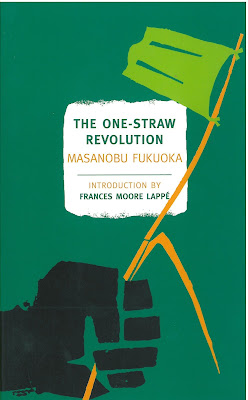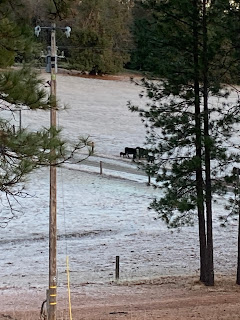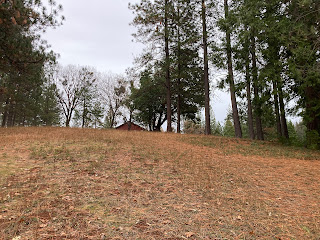My knowledge of Amish culture is pretty thin. I, like many Americans at the time, watched Harrison Ford in "Witness" (my traditional sending off of people, "Be careful out there among the English", dates from that time). Gene Logsdon has impressions of and interviews with the Amish woven in through several of his books. The Ravishing Mrs. TB and I took a vacation in Ohio that included Amish country in the early 2000's. And, of course, I am a reader of Patrice Lewis' Amish Romances (yes, even us mid-fifties guys can enjoy a happy ending).
That said, the culture and their way of life is fascinating to me - not just because many of their principles, at least as I understand them, are similar to my own, but because they have managed to maintain an effectively thriving counterculture in the press of the modern world. So imagine my joy when I found a book called Almost Amish: One Woman's Quest For A More Sustainable Life.
Nancy Sleeth and her husband Mark, a former MD, formed a non-profit organization called Blessed Earth, which originally focused on Christian involvement with the environment (but seems to have branched out in their website). In the backstory, Sleeth explains how she and her husband were faced with a series of events - death of her brother at a family gathering, a talking patient, and a particularly hard death in the ER - that caused them to re-evaluate their life choices and decide to go into Christian Ministry full time.
The book divides Amish beliefs into eight areas - homes, technology, finances, nature, simplicity, service, security, and community - gives a high level application on Amish beliefs, and then applications of these beliefs in the Sleeth's life as well as biblical teaching that correspond to each section.
I really wanted to like this book. But I went away with almost nothing new.
The book set me off on the wrong foot in the first paragraph of the introduction:
"'What are you, Amish or something?' a large man with a booming voice asked from the back of the room. I was not surprised by the question, but the tone rattled me a bit.
Open your eyes! I wanted to reply. Am I wearing a bonnet? We arrived in a Prius, not a pony.
The question came at the close of a long day, at the end of a demanding speaking tour. I was tired, but that's no excuse for my less-than-gracious thoughts. It was not the first time my family had been compared to the Amish, nor would it be the last. So why did this question stay with me, long after the seminar ended?"
The Authoress obviously feels that ultimately her response was the wrong one - but to start out her book with both assumptions about people (Large man, booming voice, rattling tone - one can almost see the "person" being described her) and what feels like virtue signaling ("We arrived in a Prius, not a pony") almost immediately, in turn, gave me an impression about what I was going to read. Simply put, there were other ways to phrase this that would have conveyed the same information without setting the tone that was set - as a blogger, I myself spend a rather surprising amount of time choosing words to communicate precisely what I want to say and avoid giving a different impression than what I intend. Words, as it has been said, mean things.
The reality is that I had purchased the book under the assumption (mistaken on my part) that this was a book about a woman and her family that had been directly exposed to Amish culture and had made changes in response to it. Instead, it was a book about decisions their family had made and how it mirrored Amish culture.
The structure of each chapter is as follows: A story about the section from the authoress' point of view is related. Then high level concepts about Amish culture is relayed, then applications from the authoress' life about how they had already implemented these practices. Lots about the authoress and her family, not a lot about how the Amish culture influenced it or them.
Another fairly disturbing thing about the book is the apparent lack of actually interaction with actual Amish. I do not know if the Amish or Mennonite cultures have an issue with interviews or research, but the book seems to be almost completely devoid actual of actual interviews or practices by actual Amish or Mennonites. Attendance of a Mennonite church service is discussed, and a very brief reference to critical books of the Amish - The Ausbund (Hymnal), The Martyr's Mirror, the Dordrecht Confession of Faith, and the Ordnung (the order of the Church and daily life) - is mentioned as well as brief (two page) history of the Amish - and some interview and listening which is alluded to but neither of which are specifically defined. The Acknowledgements section seems remarkably free of any thanks to Amish or Mennonite sources (that I can tell), and the references largely consist of a website a single text, Amish Society, and a reference to the movie "Amish Grace", covering the 2006 shooting in a Amish school in the community of Nickel Mines, PA.
I suppose all of this bothers me because it is as if I, with my limited knowledge of Japanese culture, proposed to write a book on the subject having read a single study, some articles, and watched the movie "Shogun". It would be correct to suggest of my book that it had done nothing but take limited secondary sources and proposed to present them as definitive when a plethora of primary sources are available. It is at best a weak research methodology.
The book is less about actually Amish practices and thoughts and more about the how the authoress and her family lived according to principles which they decided were important to their family - and how they realized that they were "almost Amish" principles. Which was less about at the Amish and much more about them.
As I said, I really wanted to like this book. The ideas that are presented as "Amish" - homes, technology, finances, nature, simplicity, service, security, and community - are ones that I actually resonate with (and I think many of my readers do too, as well as the bloggers on the right over there). For me at least, it is also written from a Christian point of view - again something I value. But other than the presentation of some concepts, there was nothing new here I did not know. Literally, I knew more just based on fictional reading from Lewis and interviews and impressions by Logsdon.
So why does this book exist?
Interestingly the authoress makes an almost throwaway comment in the first paragraph of the first chapter:
"Last Summer, our daughter interned with a publishing company. Emma's mentor assigned a wide range of challenging projects, and she learned a lot from them all. But the assignment where she felt that she felt as though she had the most editing input was an Amish Romance novel."
She then goes on to discuss the popularity of the movie "Witness" and the overall popularity of the so-called "Bonnet Romances" as well as the continuing popularity of tours.
All of a sudden, what came across to me is this was less of a passion project and more of a suggestion by the publisher of a way to capitalize on a trend. And capitalization on a trend, especially a surface treatment of it, just never sits well with me.
I really wanted to like this book.
What will I do with it? I have not fully decided. There were some sections that really did get me to think and so the book - at least for me - is not without some value. At the same time, it is highly unlikely that I would consult this book again as I will likely go back and review the other books I have or find some additional primary sources (Amish Society, as it turns out, is still available as a used book for a very reasonable price).
The assessment? Save your money and start with Logsdon and Lewis, who treat the Amish in the actual context of their practices, not as a comparative study.





























